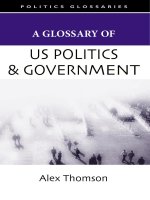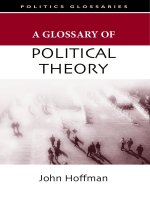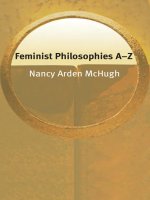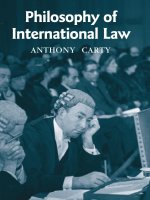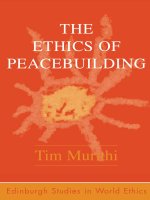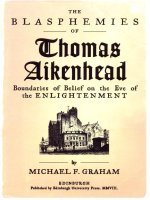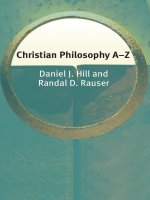edinburgh university press a glossary of political theory john hoffman mar 2008
Bạn đang xem bản rút gọn của tài liệu. Xem và tải ngay bản đầy đủ của tài liệu tại đây (875.43 KB, 216 trang )
P O L I T I C S G L O S S A R I E S
Cover design: Cathy Sprent
Edinburgh University Press
22 George Square
Edinburgh EH8 9LF
www.eup.ed.ac.uk
ISBN 0 7486 2260 8
POLITICAL
THEORY
P O L I T I C S G L O S S A R I E S
Series Editor: Keith Faulks
Glossaries in this series provide brief, clear and convenient A–Z guides to
the central concepts of the various branches of politics. They are thorough,
authoritative and concise reference works which offer clear and consistent
coverage of both traditional and contemporary terminology.
Volumes in the series provide:
• Dedicated coverage of particular topics within politics
• Coverage of key terms and major figures
• Practical examples of the terms defined
• Cross-references to related terms
John Hoffman
A GLOSSARY OF
A Glossary of Political Theory
John Hoffman
This book covers alphabetically both the major concepts in political theory
and the key writers in the field. While ensuring accuracy and objectivity, the
entries represent interpretations that are both challenging and interesting.
The premise underlying the book is that politics cannot be studied
without theory, in which case the more concrete and relevant the theory,
the better. Presenting theory in an abstract fashion makes it daunting
for students who can find it difficult to see the links between theory
and practice. The definitions in this glossary therefore relate political
ideas to political realities (i.e. everyday controversies) in an attempt to
make them as lively, stimulating and accessible as possible. Terms are
selected based upon the concepts most regularly used in teaching.
John Hoffman is Emeritus Professor of Political Theory at the University
of Leicester. He is author of numerous books including Sovereignty
(1998), Gender and Sovereignty (2001), Citizenship Beyond the State
(2004) and Introduction to Political Theory (with Paul Graham, 2006).
Edinburgh
POLITICAL THEORY
HOFFMAN
A GLOSSARY OF
A GLOSSARY OF POLITICAL THEORY
M537 - HOFFMAN PRE M_UP 13/12/06 1:19 PM Page i Gary Gary's G4:Users:Gary:P
Politics Glossaries
Series Editor: Keith Faulks
This series introduces key terms within the core subject areas of
politics. The aim is to provide a brief, clear and convenient A–Z
guide to the central concepts of the various branches of politics.
The series provides thorough, authoritative and concise ref-
erence works which offer clear and consistent coverage of
both traditional and contemporary terminology. Students and
teachers of politics at all levels of study will find the books
invaluable, though the books are aimed primarily at readers
new to a subject area. In addition to appealing to mainstream
politics students, the series will also appeal to those studying
courses in sociology, journalism, media studies and social
policy that include elements of politics.
Volumes in the series provide:
■
Dedicated coverage of particular topics within politics
■
Coverage of key terms and major figures
■
Practical examples of the terms defined
■
Cross-references to related terms
Titles in the series include:
John Hoffman, A Glossary of Political Theory
Alistair Jones, A Glossary of the European Union
Alex Thomson, A Glossary of US Politics and Government
Duncan Watts, A Glossary of UK Government and Politics
M537 - HOFFMAN PRE M_UP 13/12/06 1:19 PM Page ii Gary Gary's G4:Users:Gary:
A Glossary of
Political Theory
John Hoffman
Edinburgh University Press
M537 - HOFFMAN PRE M_UP 13/12/06 1:19 PM Page iii Gary Gary's G4:Users:Gary
© John Hoffman, 2007
Edinburgh University Press Ltd
22 George Square, Edinburgh
Typeset in 10.5/13 Sabon by
Servis Filmsetting Ltd, Manchester, and
printed and bound in Great Britain by
Cox & Wyman Ltd, Reading
A CIP record for this book is
available from the British Library
ISBN 978 0 7486 2803 2 (hardback)
ISBN 978 0 7486 2260 3 (paperback)
The right of John Hoffman
to be identified as author of this work
has been asserted in accordance with
the Copyright, Designs and Patents Act 1988.
M537 - HOFFMAN PRE M_UP 13/12/06 1:19 PM Page iv Gary Gary's G4:Users:Gary:
Contents
Acknowledgements vi
Introduction vii
A Glossary of Political Theory 1
Bibliography 194
M537 - HOFFMAN PRE M_UP 13/12/06 1:19 PM Page v Gary Gary's G4:Users:Gary:P
Acknowledgements
I am very grateful for the help and advice given to me by Keith
Faulks in writing this glossary.
I would like to thank David Cox and Morten Fugelvand of
Pearson’s Education Press for allowing me to draw upon some
of the work I have done with Paul Graham in our
Introduction to Political Theory. Gratitude needs also to be
expressed to Bryan Turner, editor of the Cambridge
Dictionary of Sociology, for permission to make use of some
of my entries in this present volume.
Also those who refereed the project, had kind things to say,
and Edinburgh University Press who are very efficient and
thoughtful publishers to write for.
I would like to dedicate this book to the memory of Lisa
Bloxham (the partner of James Hamill, a good friend of mine).
Lisa died suddenly on 2 April 2005.
M537 - HOFFMAN PRE M_UP 13/12/06 1:19 PM Page vi Gary Gary's G4:Users:Gary:
Introduction
This work assumes that politics cannot be studied without
theory. All our statements about parties, movements, states and
relationships between them presuppose theoretical views, so
that political theory is an integral part of the study of politics.
Why then are students of politics so nervous about theory?
One reason has to be that political theory has traditionally
been presented in an abstract fashion. By this I don’t mean
that theory looks at concepts and movements in general terms.
It is perfectly true that theory is not simply concerned, for
example, with democracy in the UK in the 1990s, but with
democracy as such. This generality can make students feel
nervous and unanchored, but this problem can be (at least
partly) offset by specific references and examples, and by the
use of a language that avoids awkward terms – or carefully
explains them where they are necessary.
What makes political theory abstract in the pejorative sense
of the word is a remoteness from reality and what the ordin-
ary person in the street thinks of as political controversies. A
major cause of this kind of abstraction is the idea that there is
an unbridgeable gulf between facts and values, the empirical
and the normative. I see this as a dogma that either treats
theory as an analysis of data (in the tradition that prevails in
much of the writing by political scientists in the USA) or
regards it as ‘purely’ normative so that theory is disdainful of
the facts. Contrived examples are used instead of instances
from history or contemporary controversies. All political
M537 - HOFFMAN PRE M_UP 13/12/06 1:19 PM Page vii Gary Gary's G4:Users:Gary
statements combine the normative and the empirical, values
and facts, and it is impossible in my view to say anything
about politics that does not have an ethical implication. Even
statements about individuals and freedom are controversial
for those who espouse anti-liberal and fundamentalist views.
The more that political ideas and theorists can be related to
political realities (in the sense of everyday controversies), the
more lively and interesting they become. Context is crucial
and it needs to be continually spelt out.
This view of politics inevitably affects the choice of con-
cepts and the theorists listed. The key factor underpinning my
choice has been the theorists and concepts that I have found
central to my own teaching. I have tried to bring the theorists
to life by saying something about their background as well as
their publications, and the concepts chosen, of course, express
my own values and outlook. This is particularly true with con-
cepts like the state, government, sovereignty and relation-
ships. Where I have views that many reject, and the position
adopted reflects my own particular eccentricity, I have tried to
make this clear. I seek to explain both the traditional usage
and why I depart from it.
I have found it useful to formulate the notion of a ‘momen-
tum concept’ – an idea that captures both the continuity a
concept has with the past as well as the need to reformulate it
in the light of changing historical conditions. Thus, the
concept of freedom is a momentum concept because it has a
future rather different from its past. In ancient times, it was
linked to the state; then under the influence of classical libera-
lism, it was defined as freedom from external interference.
Today it needs to incorporate a positive dimension so that
freedom involves both an absence of external interference and
a capacity to do things. This, however, is not the end of the
road. The idea of a momentum concept sees change as infinite
since future generations will add to the notion of freedom, to
continue our example, in ways that we cannot envisage today.
viii INTRODUCTION
M537 - HOFFMAN PRE M_UP 13/12/06 1:19 PM Page viii Gary Gary's G4:Users:Gar
I passionately hold the view that introductory books do not
need to be simplistic because they are introductory, or that a
definition that is profound must for that reason be complex
and elusive. I have sought to link the academically respectable
with a lively and relevant presentation. How far I have suc-
ceeded I must leave to others to judge.
Where a word appears in bold, this indicates that it has its
own listing within the glossary.
INTRODUCTION ix
M537 - HOFFMAN PRE M_UP 13/12/06 1:19 PM Page ix Gary Gary's G4:Users:Gary:
A Glossary of Political Theory
M537 - HOFFMAN TXT M_UP 13/12/06 1:22 PM Page 1 Gary Gary's G4:Users:Gary:P
M537 - HOFFMAN TXT M_UP 13/12/06 1:22 PM Page 2 Gary Gary's G4:Users:Gary:P
A
abstraction This involves a search for generalities. The word
‘chair’ abstracts ‘chairness’ from a large number of par-
ticular chairs so that we can identify it. However, when
the term is used pejoratively, it implies more than this.
Abstraction is a practical as well as a theoretical process,
and means a search for similarities at the expense of dif-
ferences.
All theory involves abstraction in that generalities
enable particular entities to be identified despite their dif-
ferences. Every word we use is abstract to an extent, since
it is impossible, for example, to use ‘table’ (to take a
rather well worn example) without ‘abstracting’ from the
differences between real tables – some are brown, some
are red, some are long, others short, and so on.
It is impossible to think without abstraction in this sense.
Abstraction is not merely a theoretical process, but a prac-
tical one as well. Marx argues in Capital that ‘abstract
labour’ relates to a real process of production in which the
power and social position of the actors as well as their par-
ticular skills have been pushed to one side, so that all that
is represented in the sale and purchase of commodities, is
what workers and the work process has in common.
When used pejoratively, abstraction denotes a process
that ignores relevant differences and therefore distorts
reality as a result. The idea of the ‘abstract individual’ is
problematic because the process of abstraction leaves out
characteristics that are relevant to understanding their
behaviour, for example whether such individuals are
women rather than men; poor rather than rich; black
rather than white, and so on. Used in this way the notion
of abstraction is mystifying, since it expresses what people
have in common at the expense of what differentiates them.
Further reading: Sayer 1987
M537 - HOFFMAN TXT M_UP 13/12/06 1:22 PM Page 3 Gary Gary's G4:Users:Gary:P
agency A concept that denotes free will. Agents are people
who can act.
Only with liberalism are all people assumed to be
agents but it is important not to treat agency abstractly.
Classical liberals, like Hobbes and Locke, assumed that
agency was something that was innate in people and con-
sidered it to be ‘god given’ and natural.
In fact, agency has to develop as people enter into rela-
tions with one another, and acquire a sense of individ-
uality and responsibility.
Agency can only be regarded concretely if it is linked
to the existence of constraints. Agents need to recognise
the existence of constraints, whether social or natural, in
order to overcome them, and therefore agency, like
freedom, can be seen as the creative recognition of neces-
sity. Thus a free person is not the person who ignores
obstacles, but the one who is able to surmount them.
Agents are contrasted to structures, and it is clear that
both are necessary for a realistic analysis of human
behaviour. Agency must be regarded as a momentum
concept, that is, it is an attribute that we cannot finally
realise, but need to work towards.
See also: liberalism, natural, freedom, structure,
momentum concept
Further reading: Ball, T. 1978
alienation Denotes a process by which a person is dominated
by a product they have created themselves. The key word
in this process is domination. An alienated person or
society is one in which their own creations appear strange
or alien to them so that instead of taking control of their
creations, they allow them to dominate them.
Marx developed the notion of alienation from his
reading of Ludwig Feuerbach who had used the notion
against religion, arguing that people worshipped a god of
4 POLITICAL THEORY A–Z
M537 - HOFFMAN TXT M_UP 13/12/06 1:22 PM Page 4 Gary Gary's G4:Users:Gary:P
their own making. Marx applied the concept to money
and capital, taking the view that people were controlled
by, rather than exercised control over, society’s wealth.
He argued that worshipping the objects of one’s creation
was not simply an economic problem: it applied to social,
political and cultural institutions as well. The state, for
example, was an alienated institution since people were
unable to see that the divisions making the state necessary
were not natural, but had been created by humans, and
could therefore change.
It is possible therefore to speak of thought processes
themselves being alienated, where they assume that ideas
exist that are beyond human control. Critics of the
concept see the notion of an ‘unalienated’ society as
vague and utopian.
See also: Feuerbach, natural, utopianism
Further reading: Fromm 1956
Althusser, Louis (1918–90) Born in 1918 in Algiers. He was
active in Catholic youth organisations. Although he
passed the entrance exam to the Ecole Normale, he was
interned in a prisoner of war camp in 1940 and here he
spent the rest of war.
In 1948 he joined the Communist Party and since he
had done well at the Ecole, he joined its staff. He became
an advocate of structuralism, and For Marx appeared in
1965, followed by Lenin and Philosophy in 1969.
Althusser argued that Marx must be purged of all traces
of humanism – the belief that humans can control their
own destiny – and he stressed that Marx’s theory must be
seen as a science of bourgeois society. Marx’s Manuscripts
of 1844 had been, he argued, inspired by Feuerbach, and
because he was hostile to Hegel, Althusser took the view
that Part I of Capital was misleading and unrepresenta-
tive. The notion of alienation was unMarxist because it
POLITICAL THEORY A–Z 5
M537 - HOFFMAN TXT M_UP 13/12/06 1:22 PM Page 5 Gary Gary's G4:Users:Gary:P
implies a humanist emanicipation, and he insisted that
there were two Marxes – a young Marx, who was a
humanist, and an older Marx, a scientist, and they were
separated by what Althusser called an ‘epistemological
break’. Marx, as he saw it, was not writing about capital
as a material reality, but as an object of thought.
In Lenin and Philosophy he advances the view that we
should characterise education and the media as ideo-
logical state apparatuses as opposed to repressive state
apparatuses, and his critics have argued that such a char-
acterisation fails to account for the relative independence
of society from the state in a liberal society.
He was influenced by Eurocommunism and argued
that classical Marxism was in deep crisis. He murdered
his wife in 1980 and was confined to an asylum and
released three years later.
See also: humanism, Hegel, Feuerbach, Marx, alien-
ation, Eurocommunism
Further reading: Callinicos 1976
anarchism A theory that opposes all forms of rule over indi-
viduals. Anarchists are opposed both to the state and
social pressures of all kinds.
Although many anarchists are socialists, not all are.
Philosophical anarchists like Godwin were radical lib-
erals who argued against the state on the grounds that it
interfered with the supremacy of a person’s private judge-
ment. Stirner argued for an association of sovereign
individuals, taking the view that all ideologies were
oppressive because they eroded this individual sover-
eignty. Woolf, a contemporary philosophical anarchist,
sees all individuals as autonomous although he accepts
the case for direct democracy in a way that worries other
anarchists, because this implies that individuals must be
bound by majority rule.
6 POLITICAL THEORY A–Z
M537 - HOFFMAN TXT M_UP 13/12/06 1:22 PM Page 6 Gary Gary's G4:Users:Gary:P
Philosophical anarchists present their arguments in
terms of abstract theory, whereas anarcho-capitalists, the
most famous of whom is Rothbard, argue that the ‘free
market’ if extended throughout society, can replace the
state.
More conventional anarchists follow the arguments of
the French theorist Proudhon, who opposed not only the
state and government, but also all forms of collective
workers’ action like strikes. Rather more militant
was the Russian anarchist Bakunin who saw the need
for violent destruction, rooted in a human instinct
for solidarity and revolt. Anarchists like the scholarly
Kropotkin (also a Russian) argued that cooperation
was vindicated by evolutionary processes, and he
sternly took the Russian Bolsheviks to task for their
authoritarianism.
Although some anarchists like Tolstoy rejected vio-
lence, it has been argued that because anarchists reject
liberal forms of political organisation, they encourage
their supporters to resort to bullets rather than ballots.
The dogmatic rejection of religion that some anarchists
espouse became a real problem during the Spanish civil
war. The anarchists not only opposed the Republican
government at war with Franco’s nationalists, but they
also burnt down churches in an attempt to rid society of
all repressive hierarchies.
Anarchism remains an influential theory among those
who feel that conventional politics has failed to improve
society. Moreover, many new social movements (like
peace, environmental and feminist movements) may
support particular anarchist ideas without necessarily
supporting the theory as a whole.
See also: Godwin, Stirner, Rothbard, Proudhon,
Bakunin, Kropotkin, Tolstoy, new social movements
Further reading: Marshall 1993
POLITICAL THEORY A–Z 7
M537 - HOFFMAN TXT M_UP 13/12/06 1:22 PM Page 7 Gary Gary's G4:Users:Gary:P
animal rights An argument that seeks to go beyond the
question of welfare for animals, and argues that animals
must be placed on a par with humans in terms of their
suffering.
The concept – and the movement that it has gener-
ated – takes the view that to allow humans to dominate
animals is profoundly wrong, and singles out Descartes’s
characterisation as animals as mere machines for particu-
lar ridicule.
Bentham took the view that animals have the capacity
to suffer, and animal rights advocates argue that while
animals may not be able to speak or use reason, the fact
that they can suffer makes them equal to humans.
The argument that humans are superior to animals is
labelled as ‘speciesism’, a chauvinism akin to racism or
sexism. Animals are sentient beings who should not be
made to suffer through experimentation for human pur-
poses, and should not be eaten.
Animal rights theorists differ as to whether the inter-
ests of animals are to be championed on utilitarian
grounds (suffering destroys their happiness) or whether
animals actually have rights, but in practice both sides
agree about the need to grant animals the capacity to live
their lives without human cruelty.
The theory suffers from a classical liberal view of
equality as sameness. It is true that animals can suffer, but
it does not follow from this that we should disregard the
profound differences between animals and humans.
Rights entail responsibilities, and just as animals cannot
have duties, so it is hard to see how they can have rights
either. The case for animal welfare is a compelling one,
but it has to be said that animals exist ultimately for
human development.
See also: Bentham
Further reading: Singer 1977
8 POLITICAL THEORY A–Z
M537 - HOFFMAN TXT M_UP 13/12/06 1:22 PM Page 8 Gary Gary's G4:Users:Gary:P
Arendt, Hannah (1906–75) Born in Hanover. She studied at
the University of Heidelberg.
In 1929, Arendt completed her dissertation on the
concept of love in Augustine. However, the rising anti-
Semitism afflicting the German polity distracted her from
metaphysics and compelled her to face the historical
dilemma of German Jews.
When the National Socialists came to power, Arendt
became a political activist. She escaped to Paris, where
she remained for the rest of the decade. Working espe-
cially with Youth group Aliyah, Arendt helped rescue
Jewish children from the Third Reich and bring them to
Palestine.
When the Wehrmacht invaded France less than half a
year later, she was interned. In May 1941, she managed
to reach neutral America. In 1951 she published The
Origins of Totalitarianism, where she traced the steps
toward the distinctive twentieth-century tyrannies of
Hitler and Stalin.
She wrote a good deal for Jewish journals, and was
associated with Partisan Review. An expanded edition of
The Origins of Totalitarianism was published in 1958,
taking into account the Hungarian Revolution of two
years earlier.
Arendt’s next three books – The Human Condition
(1958), Between Past and Future (1961), and On
Revolution (1968) – sought to reconstruct political phil-
osophy, and in 1963 she also published Eichmann in
Jerusalem. Her portrayal of a bureaucrat who claimed to
be following orders was strikingly original.
She was the first woman to become a full professor (of
politics) at Princeton University, and she subsequently
taught at the University of Chicago, Wesleyan University,
and finally the New School for Social Research. She crit-
icised military intervention in Vietnam, and in 1975 the
POLITICAL THEORY A–Z 9
M537 - HOFFMAN TXT M_UP 13/12/06 1:22 PM Page 9 Gary Gary's G4:Users:Gary:P
Danish government awarded Arendt its Sonning Prize
for Contributions to European Civilization, which no
American and no woman before her had received.
Further reading: Parekh 1981
Aristotle (384–22 bc) Born in Stagira in northern Greece. His
father hoped that he would be a doctor.
In 367 he joined the academy of Plato in Athens where
he remained for twenty years. After he left the academy,
he travelled to Assoss, where he probably began work on
Politics as well as a work On Kingship that is now lost.
In 343 bc he became a tutor to the young Alexander
the Great (although this is disputed) but returned to
Stagira, taking his group of philosophers and scientists.
Alexander persuaded Aristotle to create a rival academy,
which he founded in 335 bc in Athens. Here he is said to
have lectured on a wide range of subjects including eco-
nomics, meteorology and zoology.
On Alexander’s death in 322 bc, anti-Macedonian feel-
ings swept through Athens, forcing Aristotle to retreat to
the family house in Chalcis, where he died a few months
later.
Although his genius extended into a wide variety of sub-
jects, he wrote much on political science. He examined the
constitutions of the Greek city-states, but his most import-
ant work is Politics where he focuses on the state or polis.
He sees the state as natural, and his argument that
‘man’ is a political animal suggests that humans naturally
live together in households, villages and states. The ‘good
life’ can only be obtained in the state, and states need to
be small and self-sufficient. Aristotle’s conservatism can
be seen from the fact that whereas he regards kingship,
aristocracy and constitutional government as ‘proper’
forms, not only is tyranny and oligarchy a ‘deviant’ form,
but so is democracy. He takes slavery and patriarchy for
10 POLITICAL THEORY A–Z
M537 - HOFFMAN TXT M_UP 13/12/06 1:22 PM Page 10 Gary Gary's G4:Users:Gary:
granted. His politics are authoritarian and his texts are
important for an understanding of pre-liberal thought.
See also: Plato, natural, democracy, slavery, patriarchy,
state
Further reading: Mulgan 1977
authority A contentious concept that some see as a form of
power while others contrast it to power.
Authority involves a relationship between one individ-
ual or group and another, and is characterised by persua-
sive pressures rather than a threat of force. Authority is
often linked to morality and legitimacy, but the problem
with the latter link is, some argue, that legitimacy can be
based upon an irrational support for an elitist leader
(think of Hitler or Stalin’s legitimacy), whereas authority
requires a willingness to be critical.
The notion becomes a universal attribute under liber-
alism, which argues that influence can only be exercised
where it has been authorised. Authority is linked to
consent, but it is misleading to think that authority does
not coexist with constraint. Clearly, when a patient
recognises the authority of her doctor, she acknowledges
the constraints she is under, and seeks help.
The authority of the state, it could be argued, is inher-
ently problematic, since authority is undermined by
force, and even individuals who are not the direct recipi-
ents of the force of state are aware of the presence of this
force, and this influences their attitude towards state
‘authority’. The term ‘authoritarianism’ that ought to be
the opposite of authority captures the uncomfortable link
between the ‘authority’ of the state, and erosion of free
choice that the state implies.
See also: power, force, morality, legitimacy, consent,
liberalism, state
Further reading: Carter 1976
POLITICAL THEORY A–Z 11
M537 - HOFFMAN TXT M_UP 13/12/06 1:22 PM Page 11 Gary Gary's G4:Users:Gary:
autonomy An important concept that denotes self-
government and independence.
The concept only acquires universal status with the rise
of liberalism. However, because the term is treated in an
abstract fashion, it ignores most of the population. It
assumes that autonomous individuals are white, rational,
property-owning, Christian men and hence excludes
women, workers, artisans, blacks, and so on.
But the term helps to clarify the notion of freedom
since autonomy implies a positive (and not simply a nega-
tive) view of liberty. An autonomous person has to have
the resources to govern their own life.
Autonomy can only, it could be argued, exist in rela-
tional terms. It cannot imply an absence of constraint or
restriction for these are inherent in relationships. It sug-
gests that such constraints are recognised and trans-
formed, so that governing your own life cannot occur in a
vacuum. Autonomy is both an individual as well as a col-
lective attribute: a person can only become autonomous if
others are autonomous as well.
Moreover, the notion is a momentum concept.
Autonomy is a situation we move towards, rather than
actually reach: it is a progressive and not a static concept.
See also: liberalism, freedom, relationship, momentum
concept
Further reading: Lindley 1986
B
Bakunin, Mikhail (1814–76) Born northwest of Moscow. At
fifteen, he was sent to the Artillery School at St Petersburg.
He was posted to a brigade in Poland but resigned
from the army in 1836 in order to teach philosophy in
Moscow.
12 POLITICAL THEORY A–Z
M537 - HOFFMAN TXT M_UP 13/12/06 1:22 PM Page 12 Gary Gary's G4:Users:Gary:
Influenced by Fichte and Hegel, he went to Berlin in
1840 and joined the Young Hegelians. He travelled to
Zurich where Weitling, a German communist, made a
deep impact upon him. In Paris, he met Marx in 1844 but
preferred Proudhon. Expelled from Paris under Russian
pressure – he advocated the independence of Poland from
Russia – he took part in the French Revolution of 1848
and wrote a fiery Appeal to Slavs in Prague in the same
year. He participated in the insurrection in Dresden in
1849. Captured by Prussian troops, he was eventually
deported to Russia and spent eight years in prison. When
Alexander II became Tsar in 1855, Bakunin was banished
to Siberia where he remained until 1861.
When he moved to Italy, he began to advocate social
rather than national revolution, and developed his theory
of anarchism. He established a secret revolutionary
brotherhood, hierarchical and centralised, while calling
for the destruction of the state and for the organisation
of society by free association and federation. He joined
the First International but in 1869 clashed with Marx
who accused him of trying to set up an International
within the International. He worked for a short time with
Nechaev, a Russian nihilist, and in so doing damaged the
reputation of anarchism. He was involved in the short-
lived insurrection in Lyon.
He was enthusiastic about the Paris Commune of 1872
and wrote his first and last book, The Knouto-German
Empire and the Social Revolution, between 1870 and 1872.
See also: Hegel, Young Hegelians, Marx, Proudhon,
state
Further reading: Marshall 1993
Baudrillard, Jean (1929– ) Born in Reims, France. He began
his teaching career at the University of Nanterre and was
an eager participant in the events in Paris of May 1968.
POLITICAL THEORY A–Z 13
M537 - HOFFMAN TXT M_UP 13/12/06 1:22 PM Page 13 Gary Gary's G4:Users:Gary:
He published The System of Objects in 1968, followed
by the Society of Consumption in 1970. In 1972 he wrote
A Critique of the Political Economy of the Sign. The clas-
sical Marxist critique of political economy needed to be
augmented, he argued, by semiological theories of the
sign. What had proliferated was what Baudrillard called
‘sign value’ – the product of advertising, packaging, the
media and the sale of commodities.
In 1973, his Mirror of Production attacked classical
Marxism for its productivist bias, and in his Symbolic
Exchange and Death in 1976, he argued that the logic of
symbolic exchange must replace the capitalist logic of
production. Modernity has come to an end, and we live
in a ‘hyperreality’ in which images, spectacles and the
play of signs predominate. Differences between individ-
uals and groups dissolve, and images, codes and models
mould individual identity.
He now described himself as a terrorist and nihilist in
theory – his discourse drew heavily upon scientific
metaphor, black holes, DNA, computer language, and
so on. In Simulacra and Simulations (1981) he declared
that the media are responsible for the way people
behave, and in Fatal Strategies, published the following
year, he contended that the endless proliferation of
objects (their ‘ecstasy’) results in inertia, a complete
saturation.
In the 1990s he published The Transparency of Evil and
the End of an Illusion and he stirred up great controversy
by arguing that the Gulf War never happened. As with
11 September 2001, it must be seen as a media spectacle.
Further reading: Kellner 1989
Bebel, August (1840–1913) Born near Colgne. He trained as
a cabinet maker. In 1865 he attended the First German
Women’s Conference, held in Leipzig. In 1866 he joined
14 POLITICAL THEORY A–Z
M537 - HOFFMAN TXT M_UP 11/1/07 8:38 AM Page 14 Gary Gary's G4:Users:Gary:P
the First International. In 1867 he founded the Saxon’s
People’s Party and in 1868 he was elected to the North
German parliament. The following year he helped to
create the Social Democratic Workers Party which
merged to create what was later called the Social
Democratic Party (SDP).
In 1872 he was imprisoned for two years for treason as
a result of his opposition to the Franco-Prussian war.
From 1871 he was a member of the Reichstag, the
German parliament, a position he held until his death.
In 1875 he published a book on the Peasant War and
in 1879 he published his significant Women and
Socialism. This book was widely read and helped to
attract interest in Marxist ideas in Germany. The eman-
cipation of women is, he argued, integral to the struggle
against capitalism. Sexual activity between men and
women is private, and people no longer attracted to one
another should be able to freely separate. This work is
considered by feminists today to be more sympathetic to
the position of women than Engels’ Origin of the Family,
Private Property and the State.
In 1880 he met Marx and Engels, and contributed sub-
stantially to the party journal, Neue Zeit.
In 1891 he played an important part in creating the
SDP’s Erfurt Programme, and in 1903 he opposed the
German government’s intervention in China, and argued
passionately against protectionist measures in the
economy. He debunked the view that education was
somehow non-political. He published his autobiography
in 1911.
See also: Marx, Engels
Further reading: Maehl 1980
behaviouralism A political theory – not to confused with
behaviourism – that argues that we can only study events,
POLITICAL THEORY A–Z 15
M537 - HOFFMAN TXT M_UP 13/12/06 1:22 PM Page 15 Gary Gary's G4:Users:Gary:

